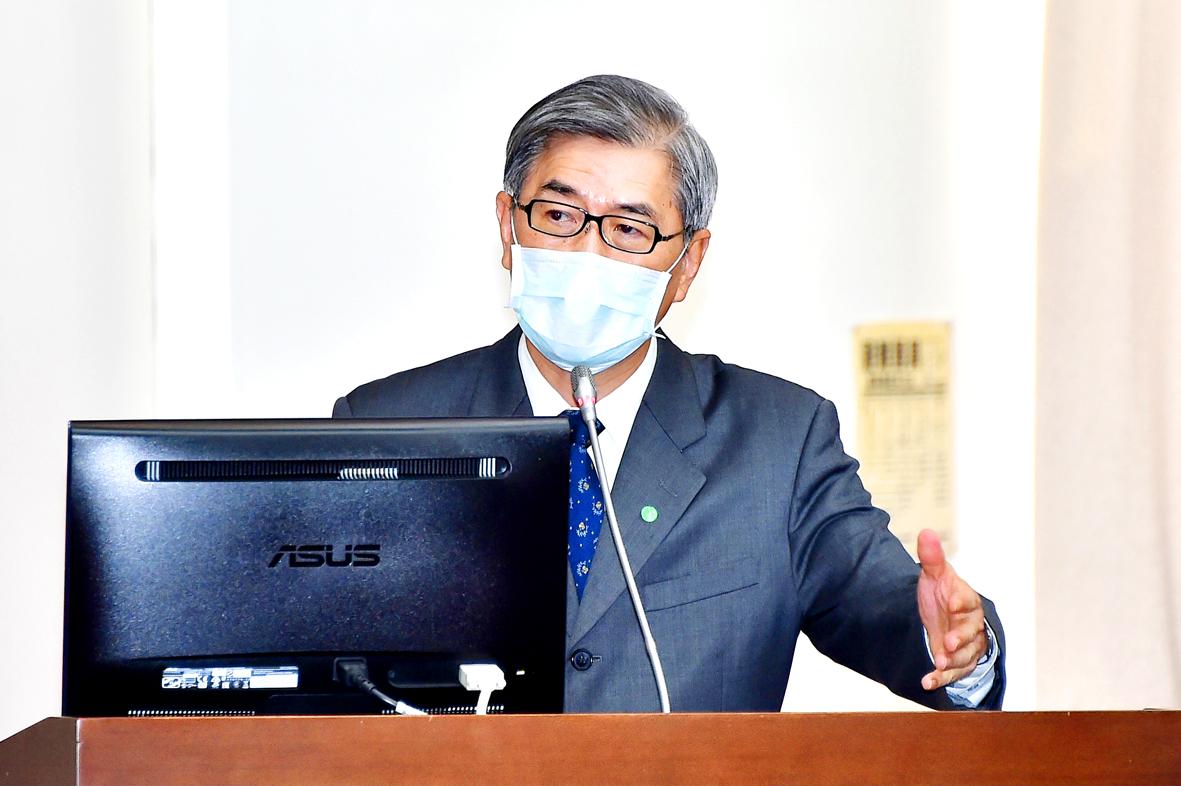The Financial Supervisory Commission (FSC) is to investigate a buy-now-pay-later service offered on e-commerce platform Shopee to determine if it is likely to trigger a credit crisis for young consumers, the commission said yesterday.
The commission would examine the service mechanism that allows consumers without credit cards to delay payments by up to 45 days to see if the service exercises solid risk control, FSC Chairman Thomas Huang (黃天牧) told reporters on the sidelines of a meeting of the legislature’s Finance Committee in Taipei.
The service, launched last month, enables consumers to pay later, or by the 15th day of the following month, without having to pay interest, Shopee’s Web site says.

Photo: Tu Chien-jung, Taipei Times
The amount of payment that can be delayed is capped at NT$30,000, with wire transfer being the only financial tool for payment, it says.
The service also offers installment payment plans, but charges annual interest of up to 20 percent, the Web site says.
“The service is more accessible and convenient than credit cards,” Shopee said on its Web site.
The service is similar to banks’ credit card or lending service, as it enables consumers to shop first and pay later, Democratic Progressive Party (DPP) Legislator Michelle Lin (林楚茵) told the meeting.
“I am worried that this service would encourage young consumers to buy things they cannot afford. What is more concerning is that if the service has no solid credit risk management, it might cause another bad debt crisis,” Lin said.
The spending limit of NT$30,000 per person sounds not too much, but younger consumers are likely to use the service, she added.
The commission would check whether it is the third-party payment service provider ShopeePay Taiwan Co (蝦皮支付) or the e-commerce platform operator Shopee Taiwan Co (樂購蝦皮) that offers the service, Banking Bureau Director-General Sherri Chuang (莊琇媛) said.
Both ShopeePay and Shopee Taiwan fall under the Ministry of Economic Affairs’ supervision due to their businesses of third-party payment services and e-commerce respectively.
However, Chuang said that the commission could have some degree of control over ShopeePay, as the firm is planning to apply for a license to run an electronic payment service in Taiwan.
The FSC should ask ShopeePay to halt the buy-now-pay-later service when the firm applies for the license, as e-payment companies are not allowed to provide loans, she said.
That is because e-payment companies already allow consumers to park money on their platforms, and if they were to grant loans, they would be too similar to banks, which are subject to tighter regulations, Chuang said.

GROWING OWINGS: While Luxembourg and China swapped the top three spots, the US continued to be the largest exposure for Taiwan for the 41st consecutive quarter The US remained the largest debtor nation to Taiwan’s banking sector for the 41st consecutive quarter at the end of September, after local banks’ exposure to the US market rose more than 2 percent from three months earlier, the central bank said. Exposure to the US increased to US$198.896 billion, up US$4.026 billion, or 2.07 percent, from US$194.87 billion in the previous quarter, data released by the central bank showed on Friday. Of the increase, about US$1.4 billion came from banks’ investments in securitized products and interbank loans in the US, while another US$2.6 billion stemmed from trust assets, including mutual funds,

AI TALENT: No financial details were released about the deal, in which top Groq executives, including its CEO, would join Nvidia to help advance the technology Nvidia Corp has agreed to a licensing deal with artificial intelligence (AI) start-up Groq, furthering its investments in companies connected to the AI boom and gaining the right to add a new type of technology to its products. The world’s largest publicly traded company has paid for the right to use Groq’s technology and is to integrate its chip design into future products. Some of the start-up’s executives are leaving to join Nvidia to help with that effort, the companies said. Groq would continue as an independent company with a new chief executive, it said on Wednesday in a post on its Web

JOINT EFFORTS: MediaTek would partner with Denso to develop custom chips to support the car-part specialist company’s driver-assist systems in an expanding market MediaTek Inc (聯發科), the world’s largest mobile phone chip designer, yesterday said it is working closely with Japan’s Denso Corp to build a custom automotive system-on-chip (SoC) solution tailored for advanced driver-assistance systems and cockpit systems, adding another customer to its new application-specific IC (ASIC) business. This effort merges Denso’s automotive-grade safety expertise and deep vehicle integration with MediaTek’s technologies cultivated through the development of Media- Tek’s Dimensity AX, leveraging efficient, high-performance SoCs and artificial intelligence (AI) capabilities to offer a scalable, production-ready platform for next-generation driver assistance, the company said in a statement yesterday. “Through this collaboration, we are bringing two

Even as the US is embarked on a bitter rivalry with China over the deployment of artificial intelligence (AI), Chinese technology is quietly making inroads into the US market. Despite considerable geopolitical tensions, Chinese open-source AI models are winning over a growing number of programmers and companies in the US. These are different from the closed generative AI models that have become household names — ChatGPT-maker OpenAI or Google’s Gemini — whose inner workings are fiercely protected. In contrast, “open” models offered by many Chinese rivals, from Alibaba (阿里巴巴) to DeepSeek (深度求索), allow programmers to customize parts of the software to suit their